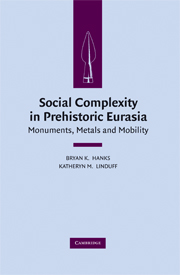Book contents
- Frontmatter
- Contents
- Contributors
- Foreword: From Myth to Method: Advances in the Archaeology of the Eurasian Steppe
- CHAPTER 1 Introduction: Reconsidering Steppe Social Complexity within World Prehistory
- PART ONE FRAMING COMPLEXITY
- PART TWO MINING, METALLURGY, AND TRADE
- CHAPTER 7 Introduction
- CHAPTER 8 Formation of the Eurasian Steppe Belt Cultures: Viewed through the Lens of Archaeometallurgy and Radiocarbon Dating
- CHAPTER 9 Late Prehistoric Mining, Metallurgy, and Social Organization in North Central Eurasia
- CHAPTER 10 The Bronze-Using Cultures in the Northern Frontier of Ancient China and the Metallurgies of Ancient Dian Area in Yunnan Province
- CHAPTER 11 Production and Social Complexity: Bronze Age Metalworking in the Middle Volga
- CHAPTER 12 Early Metallurgy and Socio-Cultural Complexity: Archaeological Discoveries in Northwest China
- PART THREE FRONTIERS AND BORDER DYNAMICS
- PART FOUR SOCIAL POWER, MONUMENTALITY, AND MOBILITY
- Index
CHAPTER 12 - Early Metallurgy and Socio-Cultural Complexity: Archaeological Discoveries in Northwest China
from PART TWO - MINING, METALLURGY, AND TRADE
Published online by Cambridge University Press: 26 January 2010
- Frontmatter
- Contents
- Contributors
- Foreword: From Myth to Method: Advances in the Archaeology of the Eurasian Steppe
- CHAPTER 1 Introduction: Reconsidering Steppe Social Complexity within World Prehistory
- PART ONE FRAMING COMPLEXITY
- PART TWO MINING, METALLURGY, AND TRADE
- CHAPTER 7 Introduction
- CHAPTER 8 Formation of the Eurasian Steppe Belt Cultures: Viewed through the Lens of Archaeometallurgy and Radiocarbon Dating
- CHAPTER 9 Late Prehistoric Mining, Metallurgy, and Social Organization in North Central Eurasia
- CHAPTER 10 The Bronze-Using Cultures in the Northern Frontier of Ancient China and the Metallurgies of Ancient Dian Area in Yunnan Province
- CHAPTER 11 Production and Social Complexity: Bronze Age Metalworking in the Middle Volga
- CHAPTER 12 Early Metallurgy and Socio-Cultural Complexity: Archaeological Discoveries in Northwest China
- PART THREE FRONTIERS AND BORDER DYNAMICS
- PART FOUR SOCIAL POWER, MONUMENTALITY, AND MOBILITY
- Index
Summary
The origin of the use of metals and alloys in China is among the central issues in current studies of the emergence of early civilizations in China. Over the past 50 years, considerable scholarly interest has focused on a debate over whether metallurgy was introduced into China or invented independently (Loehr 1949, 1956; Barnard 1961, 1983; Barnard and Sato 1975: 1–75; Ho 1975: 177–221; Smith 1977; Sun and Han 1981; Jettmar 1981; Watson 1985: 335; Muhly 1988; Wagner 1993: 28–33; Linduff et al. 2000). Most of the studies have focused on typological and technological issues concerning early metals, with only a few paying attention to the role that the use of metals and the development of metallurgy played in the emergence of complex societies in China (Linduff 1998, 2002, 2004; Shelach 2001).
Currently, our understanding of the relationship between metallurgy and socio-cultural complexity in early China is poor, and many significant questions remain to be addressed. Recent archaeological discoveries in the western regions of Xinjiang, Gansu, and Qinghai in present-day northwest China have thrown new light on the beginnings of the use of metals and alloys in that region (Sun and Han 1997; Mei 2000, 2001, 2003 a, 2003 b; Li and Shui 2000; Qian et al. 2001; Li 2003, 2005).
- Type
- Chapter
- Information
- Social Complexity in Prehistoric EurasiaMonuments, Metals and Mobility, pp. 215 - 232Publisher: Cambridge University PressPrint publication year: 2009
- 12
- Cited by



